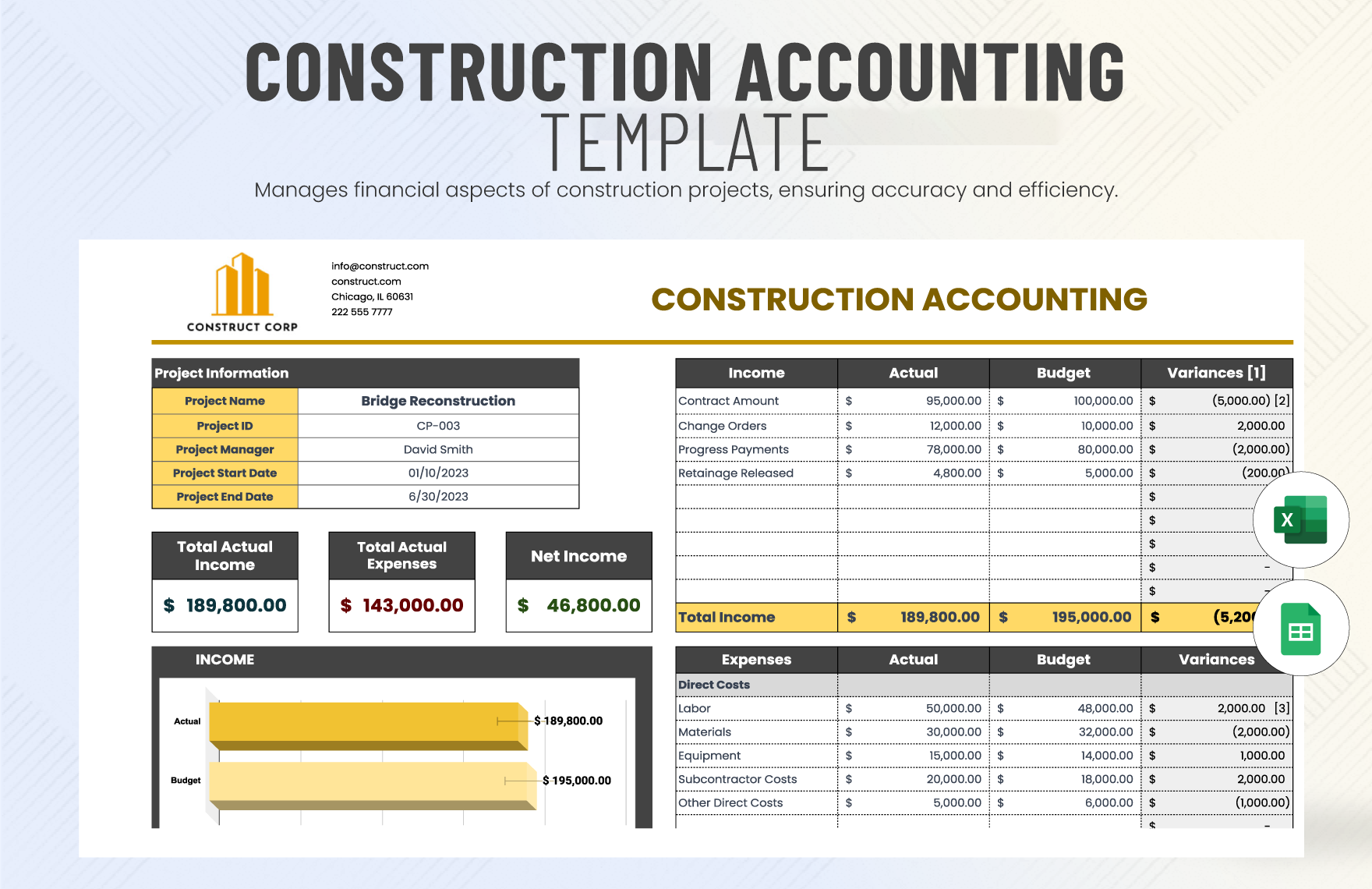The Crucial Duty of Building And Construction Accountancy in Ensuring Financial Accuracy
In the complicated landscape of construction monitoring, the role of building accounting arises as an essential component in keeping monetary honesty. By offering a framework for exact monitoring of revenues and prices, this specific accounting technique not just help in reliable project oversight yet additionally enhances stakeholder self-confidence. The ramifications of disregarding this vital feature can be extensive, influencing whatever from project timelines to total profitability. As we discover the key elements and ideal methods within construction audit, the importance of this discipline comes to be significantly obvious. What are the surprise costs that could threaten task success?
Value of Accurate Financial Monitoring
Accurate financial monitoring is the backbone of reliable building and construction accounting, acting as an essential device for job managers and economic officers alike. In the very dynamic construction environment, where spending plans can rise and fall and timelines can move, exact financial monitoring makes sure that all financial tasks are recorded and kept an eye on in genuine time. This technique enables stakeholders to make informed decisions based upon current economic data, therefore reducing the threat of overspending and improving project productivity.
Moreover, precise economic tracking facilitates compliance with regulatory needs and industry requirements. By preserving thorough documents of costs, profits, and project prices, building and construction companies can easily create essential paperwork during audits and assessments. This openness not just promotes count on amongst companions and clients but also reduces prospective legal problems.

Key Elements of Building Bookkeeping
In the world of building and construction accounting, numerous vital elements play a crucial duty in ensuring monetary precision and project success. Among the most critical aspects is job costing, which includes tracking all costs connected to a details task, including labor, materials, and overhead. This process enables precise budgeting and forecasting, enabling building companies to evaluate success effectively.
Another crucial part is modification order monitoring, which resolves modifications to the initial contract. Accurate documentation and tracking of these adjustments are vital for preserving job spending plans and timelines. Additionally, monetary reporting plays a crucial duty, giving stakeholders with insights into task performance and overall financial health and wellness.
Capital management is also significant, as it makes sure that the firm has enough liquidity to satisfy its obligations while taking care of job expenditures. Conformity with regulative requirements and tax obligations is an essential aspect of building and construction audit, guarding the firm from lawful effects.
Impact on Task Management
Reliable building accountancy significantly influences task monitoring by supplying important monetary data that informs decision-making. Exact monetary documents enable job supervisors to track budget plans, projection capital, and analyze job productivity in genuine time. This monetary understanding is important for making educated decisions concerning source allocation, subcontractor option, and job organizing.
In addition, construction bookkeeping promotes danger monitoring by identifying differences between approximated and actual prices. When task supervisors can promptly identify disparities, they can execute rehabilitative procedures to reduce possible economic losses. This proactive approach not just assists in keeping task timelines but likewise improves overall project effectiveness.
Additionally, effective building audit supports interaction amongst stakeholders, including clients, capitalists, and group members. construction accounting. Transparent economic coverage cultivates trust fund and partnership, making sure that all parties are aligned on project objectives and monetary assumptions
Finest Practices for Financial Accuracy
Establishing finest methods for financial precision within building accountancy is essential for making certain project success. A crucial technique is preserving thorough record-keeping. This includes tracking all deals related to labor, products, and expenses prices in real-time, which assists to recognize disparities early and guarantees that monetary information is constantly as much as date.

Another ideal practice is carrying out a robust budgeting process. Accurate imp source budgeting not only assists in forecasting task expenses yet likewise provides a benchmark against which actual expenditures can be determined. On a regular basis contrasting real expenses to budgeted amounts permits prompt changes and far better economic control.
In addition, conducting routine audits is vital. Internal audits can determine prospective errors or deceptive activities prior to they intensify, while external audits offer an honest evaluation of financial techniques, guaranteeing conformity with sector requirements.
Educating team in monetary management and accounting concepts is also important. Educated employees are better outfitted to find inaccuracies and comprehend the importance of monetary precision in project management.
Last but not least, promoting open interaction between task managers and financial groups boosts see page collaboration, making certain that financial decisions are aligned with job objectives (construction accounting). These best techniques collectively add to a strong structure for financial precision in building bookkeeping
Tools and Software for Building Bookkeeping
Choosing the right tools and software program for building audit can substantially simplify financial administration processes. The complexity of construction tasks requires specific audit remedies that accommodate distinct operations, task monitoring, and monetary reporting demands.
Among the leading software application choices, Sage 300 Building And Construction and Property (previously Sage Timberline) supplies detailed attributes tailored to construction companies, consisting of project management, payroll integration, and comprehensive economic reporting. copyright Desktop, while extra basic, gives personalized attributes that are advantageous for smaller building and construction companies, allowing them to handle billings, costs, and pay-roll effectively.
An additional noteworthy choice is Perspective View, which integrates audit with project monitoring, making real-time information accessible for notified decision-making. Procore likewise stands apart by giving a durable system that integrates project monitoring with monetary devices, ensuring all aspects of a project are integrated.
Cloud-based solutions like CoConstruct and Buildertrend offer adaptability and remote accessibility, permitting teams to team up flawlessly, no matter place. Inevitably, selecting the suitable software program rests on the certain requirements of the building and construction firm, the size of tasks, and budgetary restraints, making certain that financial accuracy is kept throughout the task lifecycle.
Final Thought
Finally, building and construction accounting is crucial for keeping economic precision throughout a job's lifecycle. By diligently tracking profits and expenditures, this specialized accountancy strategy improves openness, compliance, and informed decision-making. The effective administration of work expenses, modification orders, and money circulation not only decreases the threat of overspending but also promotes count on amongst stakeholders. Inevitably, the execution of robust building and construction accountancy methods significantly adds to the general success and financial integrity of building and construction projects.
Accurate economic monitoring is the foundation of efficient building and construction click here now accountancy, serving as a critical device for project managers and monetary officers alike. In the extremely dynamic building and construction atmosphere, where spending plans can rise and fall and timelines can move, precise financial tracking makes sure that all economic tasks are documented and monitored in real time. In addition, financial coverage plays a critical role, supplying stakeholders with understandings right into project efficiency and overall economic wellness.
Accurate financial records allow job supervisors to track budget plans, projection cash streams, and analyze project success in actual time. Ultimately, the application of durable construction accounting techniques substantially contributes to the overall success and financial honesty of building jobs.